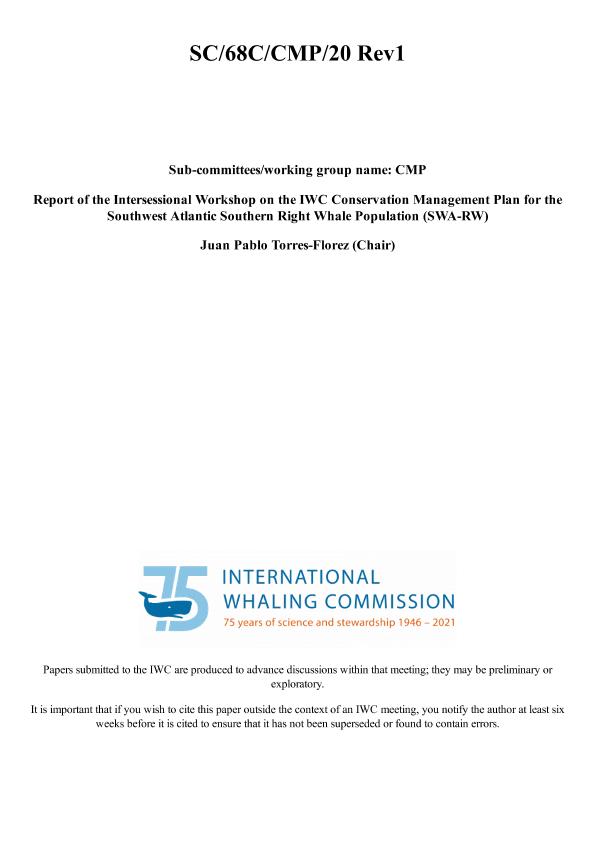Evento
Update on satellite tracking of Western South Atlantic southern right whales from Península Valdés and adjacent areas, Argentina
Tipo del evento:
Workshop
Nombre del evento:
Intersessional Workshop on the IWC Conservation Management Plan for the Southwest Atlantic Southern Right Whale Population
Fecha del evento:
14/04/2021
Institución Organizadora:
International Whaling Commission;
Título del Libro:
Report of the Intersessional Workshop on the IWC Conservation Management Plan for the Southwest Atlantic Southern Right Whale Population (SWA-RW)
Editorial:
International Whaling Commission
Idioma:
Inglés
Clasificación temática:
Resumen
Satellite tracking of Southern right whales wintering near Península Valdés, Argentina, began in 2014 (Zerbini et al., 2016, 2018) and corresponds to one of the scientific actions of the western South Atlantic right whale CMP (CMP Res-01). The original goal of this study was to describe the movements, diving behavior, migratory routes and feeding destinations of the whales. However, since 2019 the tagged whales have also been systematically monitored after tag deployment as part of a larger initiative to assess effects of tags on individual whales. Since 2014, a total of 39 (33 location-only and 6 archival) “transdermal” consolidated Type C (as defined by Andrews et al., 2019) satellite tags have been deployed on SRWs, with three tags not transmitting due to poor implantation (and therefore not considered in the data provided below). These instruments were deployed on solitary individuals (n=23) and mothers (n=13) in Golfo Nuevo (n=27) and Golfo San Matías (n=9). In addition to the transdermal tags, a new Type C “blubber-only” tag under development for right whales was deployed in 2019 in Golfo Nuevo (n=8). The latter tag represents an initiative to develop and assess performance of less invasive implantable tags for large cetaceans with support from the US Office of Naval Research (ONR) and the National Oceanic and Atmospheric Administration (NOAA). Transdermal transmitter duration has been 115 days on average (range: 18-237 days) for location only tags and 95 days (71-126) for archival tags. The 2019 season, when a new anchor design was introduced, was the most successful tracking season of this project with a mean tag duration of 134 days (range: 18-216 days). Median duration of an initial design of a blubber-only tag was 16 days (mean = 21, range: 14-34 days). Further surface modifications are expected to the blubber-only tag design to improve their retention time. Satellite tracking revealed novel and unique movement patterns of SRWs at various scales. New information has been obtained on (1) residency times and occupancy patterns of solitary individuals and mothers and calves in Golfo Nuevo and Golfo San Matias, (2) whale connectivity among different northern Patagonian gulfs and coastal habitats along the eastern coast of South America, and (3) migratory routes and habitat use on feeding destinations, including the Patagonian shelf, the western South Atlantic basin, the Scotia Sea and the northern Weddell sea. This study has also revealed the use of open ocean oceanographic features by SRWs, presumably for feeding, in middle latitudes of the South Atlantic basin. The project is expected to continue in 2021 and possibly 2022 and instrumentation of an additional 15-30 individuals are planned for upcoming field seasons. Project participants are greatly indebted to the International Whaling Commission, the National Government of Argentina and the Provincial Governments of Chubut and Rio Negro for logistical support and for facilitating/issuing permits for this work to be conducted.
Archivos asociados
Licencia
Identificadores
Colecciones
Eventos(CESIMAR)
Eventos de CENTRO PARA EL ESTUDIO DE SISTEMAS MARINOS
Eventos de CENTRO PARA EL ESTUDIO DE SISTEMAS MARINOS
Citación
Update on satellite tracking of Western South Atlantic southern right whales from Península Valdés and adjacent areas, Argentina; Intersessional Workshop on the IWC Conservation Management Plan for the Southwest Atlantic Southern Right Whale Population; Cambridge; Reino Unido; 2021; 34-35
Compartir




